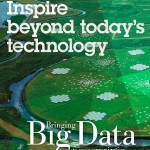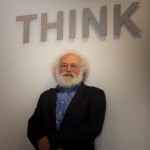Generic
The computer as an advisor, not a decision-maker – the vision of IBM Fellow John Cohn
Share this post:
It was over 50 years ago that Thomas Watson Jr. launched the IBM Fellows program, the highest honor that can be awarded to an IBM technical staffer. The accolades are handed out for exceptional contributions to scientific, technical or social initiatives that have helped create a smarter planet. IBM Fellows have been behind some of the most amazing breakthroughs in the history of IBM, from the programming language Fortran, to the systems that put the first man on the moon, to the scanning tunneling microscope (the first instrument capable of imaging atoms). There have been 246 IBM Fellows since 1962, resulting in no less than 7,500 patents, with 85 of those Fellows still working at IBM.
One of them is John Cohn, who currently has 50 patents to his name. Cohn, who has been working for the company for over 30 years, is driven by a single mission: How to make a computer smart enough to serve us to the greatest advantage possible. “The purpose of a computer is to ensure that people can do their work better,” says Cohn. “But the way in which people and computers interact frequently creates barriers to that.”
In the past, he explains, the distance between a person and a computer was very large indeed: You had to do a great deal of work on a computer before it could do something back for you. Over the years, however, computers have become increasingly faster and better adapted to humans, with new software simplifying communication between man and machine. Is that a never-ending process? “From a technological perspective, yes,” says Cohn, “but you cannot ever take humans out of the equation. People feel threatened by a computer that comes too close to them. After all, if you take too many tasks away from a person, he will feel inferior to the system.”
That’s why Cohn believes the perfect computer is one that performs monotonous work and helps to simplify our decision-making. “We simply can no longer take stock of the huge quantities of data available us [i.e., Big Data]. A good example is the Square Kilometer Array (SKA), a number of radio telescopes with a total collecting area of one square kilometer, which will study astronomical phenomena. Once the SKA project is completed in about a decade, the telescopes will, together, collect an amount of data equivalent to what is presently available on the internet – every day!”
To order and filter such large volumes of data, computers are clearly simply indispensible. But we are not yet ready for computers that have total control. “When it comes to the important issues, there has to be a person pressing the buttons. A computer can prepare everything or make suggestions, but not play an autonomous role. In other words, we want the computer as an advisor, not as a decision-maker.”
So an important aspect of the issue is finding the right balance of power. “People are often inclined to over-automate things at first and, if that leads to adverse outcomes, to then immediately backpedal, resulting in the task becoming under-automated. In order to achieve the right balance, you need people with technical knowledge – and that’s something that is frequently lacking.
“The age when computers were built by technicians alone is over, and today an increasing number of disciplines are involved in conceiving computer systems and applications – psychologists, anthropologists and behavioral scientists work hand-in-hand with hardware and software specialists.”
The result of this multidisciplinary approach should be a computer perfectly able to adapt to humans; the ultimate tool. “That’s the ideal scenario, but we’re not there yet,” says Cohn. “We are slowly developing towards that point, constantly learning from our mistakes along the way.”
 This article is printed in the November edition of our IBM Inspire Beyond Today’s Technology magazine. Download the edition here or go to ibm.com/inspire/be to request a hard-copy version.
This article is printed in the November edition of our IBM Inspire Beyond Today’s Technology magazine. Download the edition here or go to ibm.com/inspire/be to request a hard-copy version.
Automate work and accelerate business growth
Many companies need help to navigate the rapid changes that define today’s business environment. To improve their responsiveness and flexibility, they are looking for new ways of conducting business, rethinking their processes, and investing in digital transformation projects to increase the robustness of their operations. They rely on business automation technologies to cut out repetitive […]
Sustainability and the technologies enabling the transition
Creating a sustainable future demands significant technological innovation to decarbonize society, restore biodiversity and ecosystem health, foster thriving oceans for sustenance and economic growth, remove atmospheric carbon, transition to sustainable agriculture, and advance eco-friendly cities that align with our vision for a better future. Generative AI has achieved much in recent years and now surpasses […]
Technology in action at Think Summit 2021
Covid 19, the energy transition and climate change require business agility… right away! Organizations that are slowly starting their digital transformation are irrevocably overtaken by competitors: companies that can quickly realize new, sustainable business models with a remote workforce. How can organizations leverage innovations such as AI, machine learning and hybrid cloud to make […]




